Download Implementing Cisco Service Provider Advanced Routing Solutions (SPRI).300-510.BrainDumps.2020-03-03.36q.vcex
| Vendor: | Cisco |
| Exam Code: | 300-510 |
| Exam Name: | Implementing Cisco Service Provider Advanced Routing Solutions (SPRI) |
| Date: | Mar 03, 2020 |
| File Size: | 2 MB |
| Downloads: | 1 |
How to open VCEX files?
Files with VCEX extension can be opened by ProfExam Simulator.
Discount: 20%
Demo Questions
Question 1
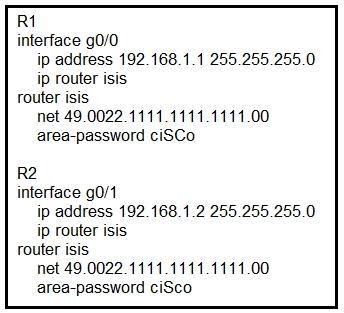
Refer to the exhibit. After you applied these configurations to routers R1 and R2, the two devices could not form a neighbor relationship. Which reason for the problem is the most likely?
- The two routers cannot authenticate with one another.
- The two routers have the same area ID.
- The two routers have the same network ID.
- The two routers have different IS-types.
Correct answer: C
Question 2

Refer to the exhibit. Which effect of this configuration is true?
- It sets the keepalive timer to 30 seconds and the hold timer to 240 seconds.
- It sets the keepalive timer to 30 milliseconds and the hold timer to 240 milliseconds
- It sets the hold timer to 30 milliseconds and the keepalive timer to 240 milliseconds
- It sets the hold timer to 30 seconds and the keepalive timer to 240 seconds
Correct answer: A
Explanation:
Reference: https://www.cisco.com/c/en/us/td/docs/ios-xml/ios/iproute_bgp/command/irg-cr-book/bgp-s1.html#wp1552800140 Reference: https://www.cisco.com/c/en/us/td/docs/ios-xml/ios/iproute_bgp/command/irg-cr-book/bgp-s1.html#wp1552800140
Question 3
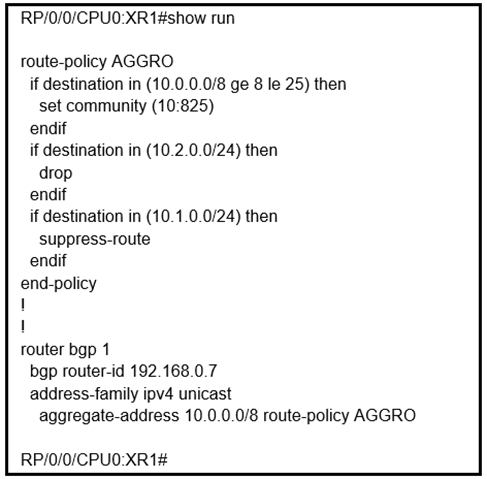
Refer to the exhibit. A network operator is working to filter routes from being advertised that are covered under an aggregate announcement. The receiving router of the aggregate announcement block is still getting some of the more specific routes plus the aggregate. Which configuration change ensures that only the aggregate is announced now and in the future if other networks are to be added?
- Configure the summary-only keyword on the aggregate command
- Set each specific route in the AGGRO policy to drop instead of suppress-route
- Filter the routes on the receiving router
- Set each specific route in the AGGRO policy to remove instead of suppress-route
Correct answer: A
Question 4
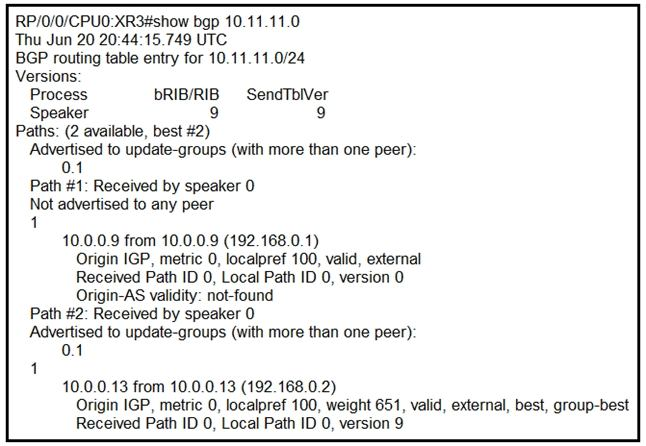
Refer to the exhibit. A network operator is getting the route for 10.11.11 0/24 from two upstream providers on #XR3. The network operator must configure #XR3 to force the 10.11.11.0/24 prefix to route via next hop of 10.0.0.9 as primary when available. Which of these can the operator use the routing policy language for, to enforce this traffic forwarding path?
- weight of 0 on the prefix coming from 192.168.0.2
- lower local preference on the prefix coming from 192.168.0.2
- higher local preference on the prefix coming from 192.168.0.1
- weight of 100 on the prefix coming from 192.168.0.1
Correct answer: C
Question 5

Refer to the exhibit. After troubleshooting an OSPF adjacency issue, routers 1, 2, and 3 have formed OSPF neighbor relationships. Which statement about the configuration is true?
- Router 2 receives a Type 5 LSAs from router 1 for its connected subnets
- Router 2 uses router 3 as the next hop for 192.168.0.0/24
- Router 2 uses router 1 as the next hop for 192.168.0.0/24
- Router 2 receives a Type 7 LSAs from router 3 for its connected subnets
Correct answer: A
Question 6
What is used by SR-TE to steer traffic through the network?
- shortest path calculated by IGP
- dynamic rules
- path policy
- explicit maps
Correct answer: C
Explanation:
Reference: https://www.cisco.com/c/en/us/td/docs/routers/asr9000/software/segment-routing/configuration/guide/b-seg-routing-cg-asr9k/b-seg-routing-cg-asr9k_chapter_0100.html Reference: https://www.cisco.com/c/en/us/td/docs/routers/asr9000/software/segment-routing/configuration/guide/b-seg-routing-cg-asr9k/b-seg-routing-cg-asr9k_chapter_0100.html
Question 7
For which reason can two devices fail to establish an OSPF neighbor relationship?
- The two devices have different process IDs
- The two devices have different network types
- The two devices have different router IDs
- The two devices have the same area ID
Correct answer: B
Explanation:
Reference: https://www.cisco.com/c/en/us/support/docs/ip/open-shortest-path-first-ospf/13699-29.html Reference: https://www.cisco.com/c/en/us/support/docs/ip/open-shortest-path-first-ospf/13699-29.html
Question 8
Refer to the exhibit. Which LSA type is indicated by this router output?
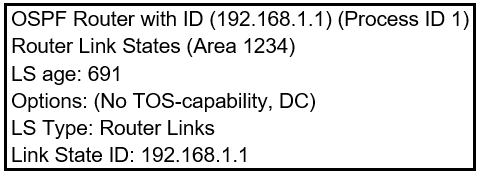
- type 3 LSA
- type 4 LSA
- type 1 LSA
- type 2 LSA
Correct answer: C
Question 9
Which statement about enabling segment routing for IGPs is true?
- Segment routing must first be enabled under then routing process and then globally
- Segment routing must first be enabled globally and then under the routing process
- Segment routing can be enabled only under the routing process
- Segment routing can be enabled only globally
Correct answer: B
Explanation:
Reference: https://www.cisco.com/c/en/us/td/docs/ios-xml/ios/seg_routing/configuration/xe-16-6/segrt-xe-16-6-book/sr-ospfv2-node-sid.html Reference: https://www.cisco.com/c/en/us/td/docs/ios-xml/ios/seg_routing/configuration/xe-16-6/segrt-xe-16-6-book/sr-ospfv2-node-sid.html
Question 10
Which task is performed when troubleshooting LDP?
- Execute the ping utility to generate information about the MAC addresses used along the path
- Verify that MPLS is disabled globally and enabled on the necessary interfaces in a per-interface basis
- Execute the traceroute utility to generate information about the labels used along the path
- Verify that Cisco Express Forwarding has been disabled on the network
Correct answer: C
HOW TO OPEN VCE FILES
Use VCE Exam Simulator to open VCE files
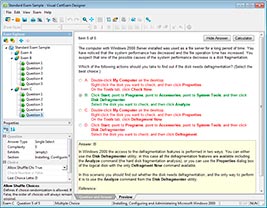
HOW TO OPEN VCEX AND EXAM FILES
Use ProfExam Simulator to open VCEX and EXAM files


ProfExam at a 20% markdown
You have the opportunity to purchase ProfExam at a 20% reduced price
Get Now!



